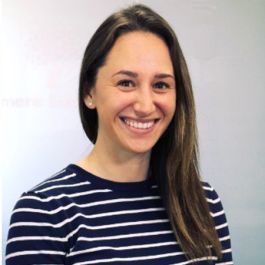You chose the right tie for the career fair, and you said all the right things in the interview. You did everything you were supposed to do, and it paid off when your inbox lit up with an offer from your dream job. Your start date isn’t for months — but the offer is here now.
True, the offer showed up after weeks of checking your phone dozens of times a day, only to be met with absence and silence — but you try not to worry about that. Their hiring team was probably swamped. Instead, you sculpt the perfect acceptance response, sign the offer letter and send them out into the internet void.
And then you wait.
As time inches closer to your start date, the euphoria of landing the job deflates into confusion and insecurity. Are you still set to begin? Do you need to have anything prepared? Where do you park at the office? You might not know any of these answers until the day you start — and until then, you could be met with radio silence from your future employer.

Most job seekers have experienced that period of silent, tense waiting, be it for a few weeks or a few months. Many of us have even come to accept it. But Scholars hasn’t.
Instead, their early-career experience platform helps to inform and center the candidate, communicating every step of the recruitment and onboarding process with empathy and transparency.
“All of the technologies used to communicate with early career talent are ultimately built for the company,” said co-founder Parker Pell. “They don’t take into consideration the candidate’s experience in the job search process overall.”
Pell and his co-founders realized that an email here or there isn’t going to satisfy the new generation of workers who value transparency and the chance to take charge of their own experiences. Instead, Scholars helps companies open up communication in their early career process at every step. From first meeting to first day, candidates have the entire onboarding timeline at their disposal in a single, accessible place.
“If the company doesn’t have Scholars, you’re left sitting on your hands awaiting an email from an employer — or maybe even cold-calling the office. But when teams use Scholars, as soon as you accept that offer and you’re enrolled in our dashboard, you have full visibility of every touchpoint you’re expected to have over the next six months.”
Companies large and small in a variety of industries currently use Scholars to center their hiring experience on the candidate while still preserving efficiency for their hiring team. The product and its philosophy benefit everyone involved — the new hires, the business that’s hiring and the employees at Scholars who get to see that the company practices what it preaches at home.
Recruitment statistics, direct from hirescholars.com:
- Most reneges on offers happen in the first two weeks after accepting.
- Timely responses from employers was the number one factor for Gen Z signaling a positive candidate experience.
- The average hiring process for someone already in the workforce is 23.8 days — for college students, it could be eight months to a year.
Either/Or Into Both/And
As a customer success manager at Scholars, Mary Anne Kiker has first-hand accounts of how their product provides the best experience for both sides of the hiring process.
“It’s always seemed like an either/or — hiring managers can either maintain their team’s time and efficiency or create a 10-star, amazing candidate experience for future employees. But Scholars is asking how we can bring those two needs together,” she said. “We have the capabilities to help teams deliver that candidate experience without losing efficiency. It’s very achievable with the tools that we have.”
“I had someone from a Fortune 500 company who’d worked in the early recruiting experience industry for twenty-five years look at our technology and say: ‘I’ve never seen anything like this. The UI is super simple and makes total sense. We’re not solving for this,’” Pell added.
Which begs the question: Why aren’t more companies solving for these needs? After all, according to Scholars’ own blog, 52 percent of hiring managers feel like candidates have the power in the current market.
“The candidate experience in the world of Scholars is all about providing the best, most engaging experience regardless of where they are in the recruiting funnel.”
Product Marketing Manager Hannah Wright’s theory is that plenty of companies are trying — but it can be a struggle to see the big picture.
“The candidate-first mentality is really tricky,” said Wright. “I think companies slice it out and focus on individual parts of the candidate experience — one-click application, clear job descriptions, things like that.”
In contrast, Scholars takes a much more holistic approach.
“The candidate experience starts when you’re first exposed to an organization and goes all the way through your last day,” Wright said. “Scholars can be used across that whole journey. The candidate experience in the world of Scholars is all about providing the best, most engaging experience regardless of where they are in the recruiting funnel.”
Practice What You Preach
As a newly-onboarded member of the Scholars team — having started this past spring — Wright can attest that the company’s dedication to an engaging candidate experience applies to their own people as well.
“That theme of transparency is key to how we operate as a company,” said Wright. “Parker and Ben made me aware early on of the steps of the hiring process and what to expect at each touchpoint. It felt very personal and built immediate trust — I felt like I had just as much say in the final decision.”
To provide the optimal early career experience for candidates and companies alike, it’s important for Scholars to know what candidates need — and once they have that information, they can apply it to their own team. While most of that knowledge is geared toward catering to Generation Z, a transparent and person-first experience is something any candidate can benefit from.
“That theme of transparency is key to how we operate as a company.”
“I’m thirty-one, so I’m the grandma of the group,” Wright said with a laugh. “But that means I have experience at other places to compare to my experience at Scholars as a new employee.”
“We’re not preaching things that we’re not practicing ourselves,” added Pell. “There’s a lot of collaboration and transparency, and clearly defined goals as well.”

The recruitment sector is constantly changing — candidate and company needs shift with the market. To keep up with that knowledge, Scholars builds their roadmap with the help of client feedback. The company maintains close relationships with their clients through the whole implementation process, and does their best to make sure they feel supported and heard.
“I love feedback — good, bad or indifferent,” said Kiker. “This is a partnership. We don’t just drop stuff on their desk and say ‘good luck, figure it out’ — we’re with them every step of the way. Anytime questions come up, we take it a step further and serve as strategic advisors.”
That feedback serves as a foundation for building Scholars’ future.
“On top of hearing about how our product is working for them and their goals, we want to know what pain points they’re experiencing. We want to have that conversation about what’s happening in the industry,” Kiker said. “That something that sets us apart — we want to hear your problems and take them into consideration as we grow and evolve as a company.”











